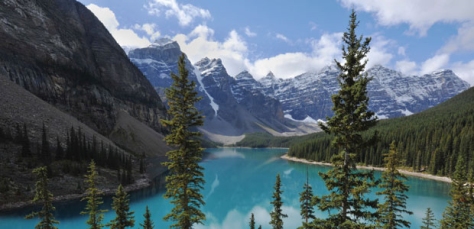In my last post, I briefly mentioned my fascination with, and love for, North America and its wild places. This long-time love affair started when my parents first took me stateside in 1999, and has established a firm grip on my imagination over the years as I spent extended periods of time travelling (and living in) the US and Canada. Throughout the years, I have annoyed many a friend (or random stranger) with my obsessive, pseudo-poetic talk about the North American wilderness.
Recently, I had a discussion with one of my friends here in the UK about the role of America in protecting (or harming) the environment. I pointed out the large number of environmental NGOs in America and the amount of money Americans annually donate to them. Also, though I did not mention this at the time, it is a fact that the US pioneered the concept of National Parks by designating Yellowstone as the first National Park in 1872, thus establishing the idea of setting aside areas of high ecological value to protect them for future generations. My friend’s rebuttal to this was that NGOs only have so much power, and that politicians and governments could achieve a whole lot more if they set their mind to it, which, in her view, they were not. In light of recent headlines from North America, there appears to be a lot of truth in this, as American and Canadian NGOs are currently standing helplessly by as government agencies are waging a war on some of the continent’s most iconic wildlife.
Over the past few weeks, my Facebook and Twitter feeds have been flooded by troubling headlines from Alberta and British Columbia, where provincial governments have given the green light to a program that will see the shooting of wolves from helicopters. What could possibly justify the killing of vast numbers of ecologically important, highly socially intelligent animals, you might ask? According to the Canadian Ministry of Forests, Lands and Natural Resources, the cull is a necessary action to stop the dramatic decline of boreal caribou numbers (also known as reindeer). A logical conclusion, right? Fewer wolves means fewer caribou kills, and everyone can go home happy, knowing that wolves have been killed for the greater good. Except that, like most things in life, it’s not quite as straightforward as this. The underlying issue of caribou decline, it turns out (who would have thought!), is the loss of their natural habitat, brought about by industrial activity such as logging, fracking or mining. In other words, wolves are a symptom, and not the root cause of the problem.
Unfortunately, symptoms are much easier to spot by the naked eye, and human nature is too much geared towards the kneejerky and immediate to resist the temptation of an apparent easy fix. While the Canadian federal government (a conservative government, mind you) has recognized the importance of protecting caribou habitat and called on provinces and territories to restore at least 65% of said habitat by 2017, this call has so far gone unheeded, as placing the blame on carnivores being, you know, carnivores has turned out to be the more business-friendly approach.
In a similar, even more depressing story from the American side of the border, US federal agencies allowed an annual wolf and coyote killing contest to take place on federal land in Idaho. Its premise is as simple as it is revolting: Go out and shoot as many wolves and coyotes as you can, you may even win the price for most animals killed! The event’s organizers are a group called for Idaho for Wildlife, and though it is tempting to suspect that name was chosen ironically, it is highly doubtful that the concept of irony plays a part in the lives of this sad tale’s protagonists You want evidence for this assumption? How about the local deputy quoted as saying “Have you ever seen what a wolf does to livestock? It ain’t right. What kind of an animal kills for killin’s sake like that”? This not only is yet another case of carnivores being blamed for being carnivores and acting according to their natural instincts, but also clear evidence of a complete lack of self-reflection (a prerequisite for irony), as killing “for killin’s sake” is precisely what the event’s participants came to do.
What these two stories from either side of the American-Canadian border have in common is a complete failure by public authorities to manage the land under their supervision on the basis of sound science, and in the best interest not only of wildlife, but also the general public. Not being a resident of Alberta, British Columbia or Idaho, I still highly doubt that the majority of the population would be in support of any of these programs, which apparently does not matter when certain interests by a small but vocal and politically powerful minority (logging, mining, fracking, livestock industries) are at play. It is time for public land officials to represent the taxpayers they rely on and stand up to those who have a vested interest in the exploitation and eradication of the natural world.


